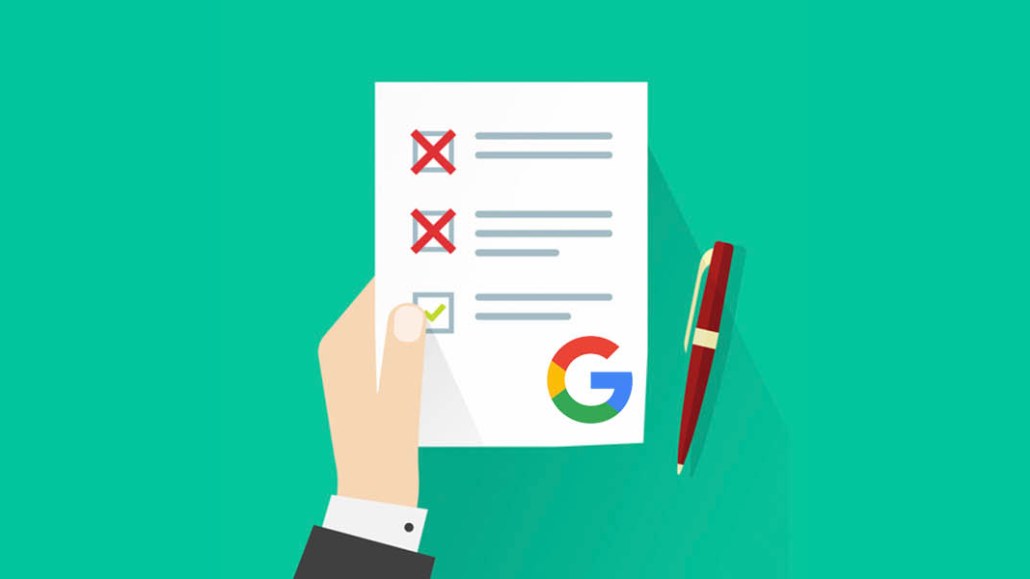Secure your place at the Digiday Media Buying Summit in Nashville, March 2-4
While Facebook battles fires, Google rolls out pro-publisher initiatives

Google announced on March 20 a slew of initiatives aimed at helping news publishers, part of the tech giant’s continued effort to present itself as a friend to the industry.
Under the umbrella Google News Initiative, the search engine rolled out the long-anticipated Subscribe with Google, which will let people subscribe to paywalled publications through Google in a two-click process. Google also is testing the ability to show subscription offers to users who are deemed to have a propensity to subscribe based on their search history.
Google announced it would give more preference to quality, or so-called authoritative, news outlets in search results as well, especially in times of big news crises when rumors and misinformation are more likely to surface. This process is also being applied to news searches on Google-owned YouTube.
A number of other new initiatives were announced, including ones to train journalists to identify misinformation online, provide more help to local news outlets and promote news literacy among consumers. Google also said it would spend $300 million over three years to help the news industry.
The Google News Initiative was announced at a long-planned three-hour news conference at a rented space in New York City, but its contrast with the firestorm that’s engulfing rival Facebook couldn’t have been more stark. The social network is under fire for the misuse of its user data by Donald Trump-linked data firm Cambridge Analytica; it’s also in the doghouse with publishers for being slow to help them monetize their content and deprioritizing news.
Google execs didn’t have to bring up the subject of Facebook directly; it was enough that company executives talked repeatedly about “collaboration” and “partnering” with publishers while attendees from titles including The Washington Post and The New York Times nibbled from passed plates of avocado toast and sipped smoothie shots.
“We want you to have the ability to diversify beyond ads,” said Philipp Schindler, svp and chief business officer at Google. “We are all-in. We can’t do it without you.”
“Collaboration is so important to what we do,” said Bonita Stewart, vp of global partnerships.
The news fell for the most part on a friendly audience of publishing and industry execs. Google in recent months has made other pro-publisher moves such as ending First Click Free, a measure that required paywalled publishers to let people freely read their articles in order for the publisher to appear in Google search results. Many feel it’s generally taken a more collaborative approach than Facebook has.
There were still questions about how the new initiatives would play out, though. Google didn’t give specifics about how the $300 million would be allocated. For publishers with alternative reader-pay models, there was no word on models to help publishers drive memberships or donations. City University of New York journalism professor Jeff Jarvis said he’d like to see Google use its vast data on users to help publishers personalize the experience on their own sites. “In mass media, we treat all the people the same, and the future is serving people with relevant information,” he said.
The effort to prioritize high-quality publishers was received well in general, but there was some wariness about how it would be implemented across different types of publishers and if it would give preference to publishers that use Accelerated Mobile Pages, the fast-loading mobile pages feature that Google has been aggressively pushing.
Richard Gingras, vp of news products at Google, said AMP would not be a factor in a publisher’s authority ranking, nor would a publisher’s size or prominence. He stressed that the emphasis on authority would depend on the search query, though, and play a bigger role in breaking news searches.
Google’s black-box search formula makes it impossible to predict how any one publisher will benefit. A publisher that’s an unquestioned authority in news may not be seen that way when it comes to its editorial page, for example. The system also depends on Google staying ahead of bad actors who try to game the system with misinformation.
More in Media

Media Briefing: Turning scraped content into paid assets — Amazon and Microsoft build AI marketplaces
Amazon plans an AI content marketplace to join Microsoft’s efforts and pay publishers — but it relies on AI com stop scraping for free.

Overheard at the Digiday AI Marketing Strategies event
Marketers, brands, and tech companies chat in-person at Digiday’s AI Marketing Strategies event about internal friction, how best to use AI tools, and more.

Digiday+ Research: Dow Jones, Business Insider and other publishers on AI-driven search
This report explores how publishers are navigating search as AI reshapes how people access information and how publishers monetize content.








